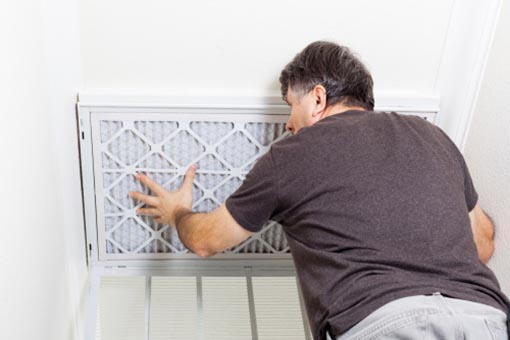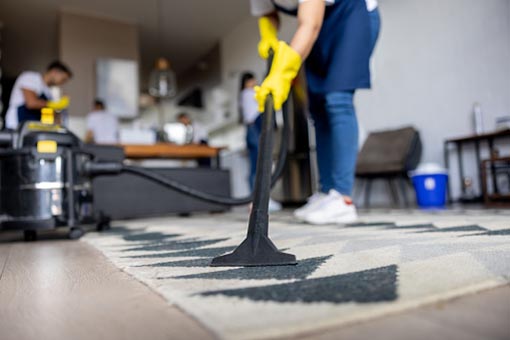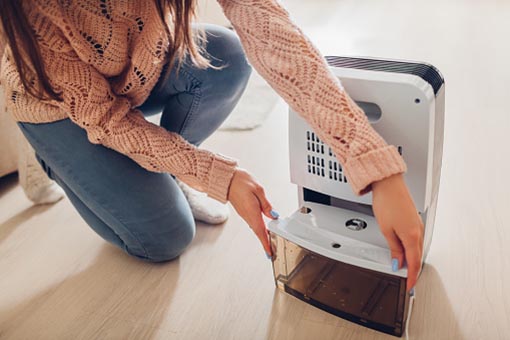HVAC Expert Reviews Top Indoor Air Quality Errors Homeowners Commit
Expert Reveals Indoor Air Quality Do’s and Don’ts
No matter the season, homeowners often modify their thermostat settings to stay comfortable. When the weather is moderate at certain times of year, many homeowners prefer to open the windows and depend on their HVAC system less. At the same time, summer and winter can often cause problems for indoor air quality (IAQ) since extreme temperatures also mean keeping the home sealed from the outdoors—to keep the cool air in during summer and the heating in winter.
You’ll have an easier time securing good indoor air quality if you don’t make the same common mistakes homeowners can make. Bryant Heating & Cooling Service Experts Chief Operating Officer Cary Reed covered several of these mistakes and how you can avoid them.
Not Changing Air Filters Consistently Enough

Swapping out your air filters minimizes the dust, allergens and other airborne contaminants that lower air quality in your home. For anyone with allergies, failure to change air filters regularly could lead to sneezing, watery eyes or even result in trips to the doctor. If you’re committed to utilizing the right filter for your unique system and situation, familiarize yourself with the Minimum Efficiency Reporting Value system, commonly shortened to MERV, Reed suggested.
“It’s based on a 1 to 20 scale, and ratings in the center of that range tend to be higher quality home filters,” Reed said. “And, if you haven’t been consistent with filter changes, I’d also advise a duct cleaning service too. After that, set up a system that reminds you when it’s time for air filter replacement”
Ignoring HVAC Maintenance
Skipping preventative HVAC maintenance is usually homeowners’ first step toward compromising your indoor air quality, Reed added. An annual tune-up helps it continues to deliver comfort smoothly and helps to avoid major repairs down the line. Besides checking all of the electrical components and coolant levels, tune-ups involve cleaning coils and heating elements where air passes through before moving through the rest of your home. If a system isn’t running like it should, dust or moisture may accumulate and become the starting point for pollutants making it indoors.
Using Products that Lower the Quality of the Air Unknowingly

Homeowners are often shocked to learn that common household products could be harming their home’s air quality and even their health. In general, there are three ways homeowners might be affecting their indoor air quality without noticing. The first is by always using aggressive cleaners that release fumes and substances known as volatile organic compounds (VOCs). With so many alternatives available, select an eco-friendly cleaner instead, Reed recommended.
“Strongly scented candles are also a common air contaminant,” Reed said. “Despite having nice scents in the home, this is not the best option. I even warn homeowners against using many air fresheners.”
Another way people contaminate their home’s air quality inadvertently is with indoor plants that may trigger allergy symptoms. The Ogren Plant Allergy Scale (OPALS) is a straightforward 1 to 10 scale that is commonly employed to determine a plant’s potential for worsening symptoms for allergy sufferers.
“There are many choices that are considered ideal indoor plants such as ferns, ivy, fig and yuccas, but these plants can also trigger allergy symptoms. It’s never a bad idea to look into it before picking indoor plants,” Reed said.
Overlooking Mold and Moisture Problems

Too much humidity in a home can induce mold and bacteria growth, which in turn may compromise indoor air quality. If you discover a plumbing leak and water is starting to stain or damage the walls or another area of your home, repair it as quickly as you can, Reed insisted. Humid, musty air is often when the growth of mold begins, especially if you reside in a wetter part of the country.
If you keep noticing a musty smell coming from somewhere, that’s a sign moisture may be trapped somewhere. Some homes also face issues with either too much or too little moisture in the air, which is often resolved by balancing humidity levels with a whole-house humidifier or dehumidifier system, Reed added.
Not Taking the Opportunity to Open Windows When Practical
While it may be tough to keep the windows open right in the middle of a cold snap, there are plenty of days throughout the year when cracking open a few windows to let in some fresh air is a good idea. Not only is it beneficial for in-home air quality overall, but it can even lower radon levels. This radioactive gas is naturally released from soil. In fact, buying an inexpensive detector from a home improvement store is a valuable investment, considering high radon exposure is responsible for roughly 21,000 lung cancer deaths every year, as reported by the CDC.
To keep the air refreshed even when it’s cold outside, use those midday temperature highs to crack the windows in rooms and other spaces. And for summer, use early morning air when it’s cooler to refresh your indoor air, Reed suggested.
Not Taking Advantage of Technology and Services that Can Help
Whether your home has “problem air” due to excessive humidity levels, mold, viruses and other airborne particles, there are still lots of solutions, explained the HVAC pro.
One option includes installing germicidal UV light lamps, placing one inside your HVAC system to sterilize bacteria, viruses and other microbes instantly. Other homeowners benefit most from ventilation systems that replace stagnant indoor air for fresh air, or whole-home air purifiers that can assure you enjoy a constant flow of fresh, clean air indoors.
“An air quality professional can also perform IAQ testing to help you fully grasp the depth of the problem,” Reed said. “Just like with HVAC system maintenance, ignoring these problems only makes them more severe in the future. The good news is there are many ways to address air quality concerns.”
For details on how to reach peak indoor air quality, visit ServiceExperts.com/indoor-air-quality or request HVAC maintenance soon.
